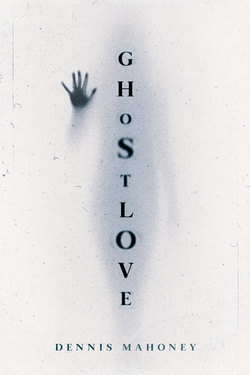Читать книгу Ghostlove - Dennis Mahoney - Страница 10
На сайте Литреса книга снята с продажи.
Оглавление4. ALONE TOGETHER
Communicating by psychokinetic touch took some getting used to.
June’s ease in tracing letters on my skin contrasted with my struggle to identify the shapes. Depending on her position in relation to my hand, her letters would appear in various directions. Sitting beside me, they were normal, but whenever she stood in front of me, her letters were backwards and upside-down on my upturned palm.
I asked her to use only capital letters, eleven of which are vertically symmetrical, and my mind soon adapted to the remainder’s backward shapes. Upside-down was harder. But the greater challenge was piecing together words, and ultimately sentences, from a series of overlapping, rapid-fire letters. Whenever I lost the thread, every letter thereafter tumbled into chaos, and June was often forced to clarify or repeat her thoughts completely.
But immersion worked wonders and we quickly grew fluent. I continued to speak aloud, knowing she could hear me, and although we’d been communicating on the foggy glass for weeks, our freedom from yes-or-no exchanges felt revelatory and new.
“THANKS,” June said.
“For what?”
“FIGURING THIS OUT.”
“Thanks for talking to me. You’ve been my only friend since I moved here. Actually, you’ve been my only friend in a long time.”
I smiled when I said it, wondering if smiles could exist without bodies. I decided they could and felt—or hoped—June was smiling back.
“LONER CLUB,” she said. “NEVER REALLY TOGETHER.”
“Of course we are. It’s like a phone conversation.”
“TEXTING FROM BEYOND.”
“We’re a long-distance relationship in the same room.”
“LIKE EVERY RELATIONSHIP. SORRY.”
“For what?”
“PESSIMISTIC BEING DEAD.”
I had already asked her twice why she’d written the word “death” when I’d asked her what she needed. She claimed she’d written “breath” because she’d wanted a pause to calm herself, excited as she’d been to properly communicate. I sensed it wasn’t true but didn’t want to push.
“Tell me everything,” I said. “What’s your last name?”
“ASK SOMETHING ELSE.”
I had exposed myself for weeks, physically and emotionally. That she wouldn’t share her name seemed grossly unfair. Was she hiding her identity or harboring a secret? Instead of showing my frustration, I took a long pause and listened to my nightstand clock, which I’d partly learned to interpret by the rhythm of its ticks. It was after 3 a.m., a time when the clock seemed reluctant to advance.
“Did you live nearby?” I asked.
“YES,” June said.
“Is your family here, too?”
“NO.”
“We’re beyond yes and no,” I said. “I want to get to know you. It hurts me that we’re finally able to talk and you’re refusing.”
“I’M SORRY.”
“Tell me anything you can.”
“I DON’T REMEMBER.”
“You don’t remember what?”
“MY LIFE,” June said.
Recalling our window conversations from the previous weeks, I realized how little I’d actually learned about her, and how much of her vagueness I’d attributed to the limits of our yes-or-no talks.
“You don’t have a brain!” I said, excited by a theory I had frequently considered. “If your memories existed in your synapses and neurons, it only makes sense that most of them were lost.”
She radiated grief, like a dark solar wind, and left me feeling poisoned.
“June,” I said. “I’m sorry. It’s just an idea that probably isn’t true.”
